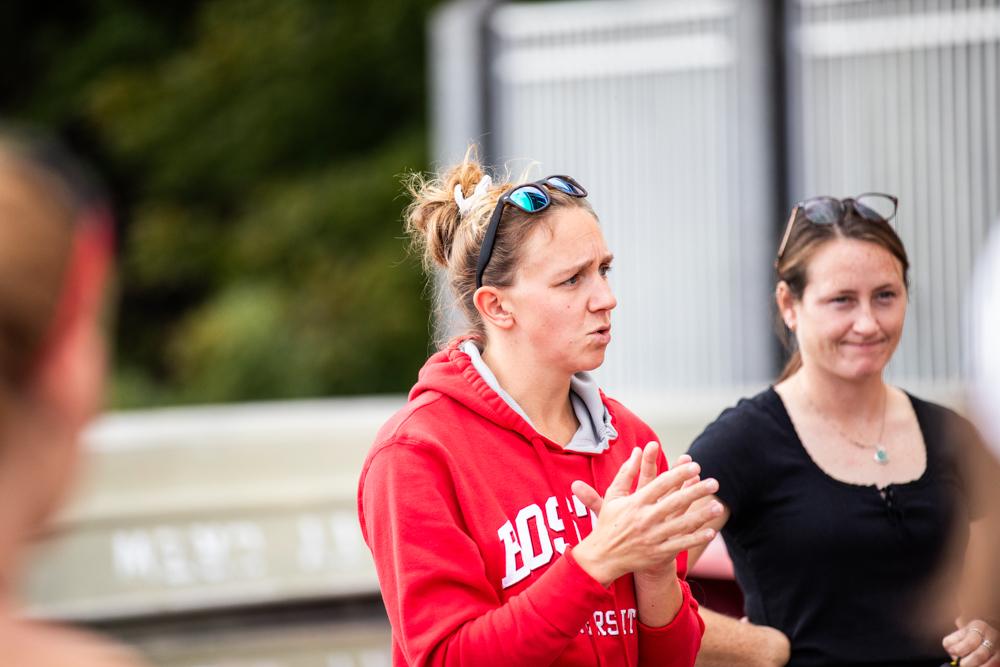The BU women’s lightweight rowing team celebrated its 10th anniversary earlier this year. A decade ago, the team was made up of athletes who didn’t know how to row or put a boat in water, head coach Malcolm Doldron said.

Today, the team has grown from 14 to 35 rowers, Doldron said, and has been Intercollegiate Rowing Association National Championship runner-ups four times since 2016.
The team was formed in 2012 in response to the creation of the men’s lacrosse team, which required adding a women’s team to maintain gender equity, Doldron said. According to row2k, nine out of 171 collegiate rowing programs in 2022 include lightweight women’s teams. A female lightweight rower is classified as someone less than 130 pounds.
Doldron said lightweight rowing allows those who are naturally smaller to compete on a more level playing field since rowing is a leverage-based sport. It also allows boats to be rigged to a smaller athlete, as opposed to the stereotypical tall rower.
“If you look at any of the top 20 programs, there are a lot of 5’10,” 5’11,” six-foot women that are just larger, have longer limbs and larger body sizes because that creates better leverage,” Doldron said. “When you are focusing in on that population, there’s another population that’s missed, and those are those smaller athletes that want to participate.”
Junior coxswain Rayna Kuthiala, a student in Sargent College of Health and Rehabilitation Sciences, said the lightweight team offers a chance for more athletes to compete.
“(Lightweight rowing) gives them a place to really excel and perform at an elite level that most people wouldn’t get collegiately,” Kuthiala said.
USRowing has banned lightweight rowing from their events on the youth level in part to prevent athletes who are not naturally lightweight from forming unhealthy habits, such as eating disorders. However, lightweight rowing is not banned on the collegiate level. At the collegiate level, there is more knowledge on maintaining healthy habits, and BU monitors its lightweight athletes to ensure they stay healthy, Doldron said.
“Inherently, I think the programs that exist are programs that do it right. No system is perfect,” Doldron said. “We are probably the most innovative in our approach. We have an interdisciplinary care team, a very robust lightweight policy that allows for our student-athletes to be healthy.”
BU’s lightweight rowing team has produced seven All-Americans, three national championship lightweight doubles crews at the IRA and boasts a 75% win record, Doldron said.
Senior rower Delaney Bernier, a student in the College of Engineering and captain of the lightweight team, has been rowing for nine years. She said the presence of lightweight teams at nearby colleges makes it more necessary for BU to keep pace.
“What is especially important for BU to have a lightweight team is that we have other lightweight teams on the Charles, and I think having that competition right there makes our school also more attractive,” Bernier said. “It keeps us competitive.”
Doldron, who was Columbia University’s recruiting coordinator before coming to BU in 2011, originally refused the role of head coach. He changed his mind after realizing the opportunity he had to build a rowing program from the ground up. Doldron explained that when the team was first formed, the recruiting deadline had passed. This meant that the students who joined the team were mostly novice rowers.
“It was really great to watch them learn and watch them develop at that time because they were just so new to it. Every day was an adventure,” Doldron said. “I learned a lot about myself as a coach, and just how specific I needed to be with those younger athletes and student-athletes in order to support them and support their learning.”
Despite the fact that the lightweight rowing team has nearly doubled in the past 10 years, Doldron said that it has continued to act like a small team.
“Even today, you walk into a practice session, the group will seem like a much smaller team than it actually is because they know each other, they care about each other, they support each other,” Doldron said.
Bernier says that when she joined the team as a freshman, she was shy. However, in the past four years, she has grown as a person because Doldren has fostered a culture of developing life skills.
“Malcolm, specifically, really encouraged me to speak up and find my place on this team. Now I’m captain, and I’m not afraid to use my voice,” Bernier said. “I’m learning lessons about teamwork and leadership and sacrifice and commitment.”
Doldron hopes to not only continue to win races, but to also prepare his athletes for all kinds of future accomplishments.
“This is bigger than BU Lightweight rowing, this is life,” Doldron said. “(It’s about) helping them learn these skills so that they can step out into the real world and make an impact. That’s the direction of the team.”





















































































































